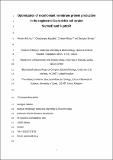Files in this item
Optimization of recombinant membrane protein production in the engineered Escherichia coli strains SuptoxD and SuptoxR
Item metadata
| dc.contributor.author | Michou, Myrsini | |
| dc.contributor.author | Kapsalis, Charalampos | |
| dc.contributor.author | Pliotas, Christos | |
| dc.contributor.author | Skretas, Georgios | |
| dc.date.accessioned | 2020-06-05T23:34:41Z | |
| dc.date.available | 2020-06-05T23:34:41Z | |
| dc.date.issued | 2019-06-06 | |
| dc.identifier | 259585564 | |
| dc.identifier | bbfd3e19-d1c7-45cf-84c2-f6f3fe04d1a7 | |
| dc.identifier | 31243979 | |
| dc.identifier | 000476957300018 | |
| dc.identifier | 85070118447 | |
| dc.identifier.citation | Michou , M , Kapsalis , C , Pliotas , C & Skretas , G 2019 , ' Optimization of recombinant membrane protein production in the engineered Escherichia coli strains SuptoxD and SuptoxR ' , ACS Synthetic Biology , vol. Articles ASAP . https://doi.org/10.1021/acssynbio.9b00120 | en |
| dc.identifier.issn | 2161-5063 | |
| dc.identifier.other | ORCID: /0000-0002-4309-4858/work/59464867 | |
| dc.identifier.uri | https://hdl.handle.net/10023/20051 | |
| dc.description | Funding: CP would like to acknowledge the Royal Society of Edinburgh, Tenovus (T15/41), Carnegie Trust (OS000256) grant awards and the School of Biology of the University of St Andrews for a PhD studentship to CK. | en |
| dc.description.abstract | Membrane proteins (MPs) execute a wide variety of critical biological functions in all living organisms and constitute approximately half of current targets for drug discovery. As in the case of soluble proteins, the bacterium Escherichia coli has served as a very popular overexpression host for biochemical/structural studies of membrane proteins as well. Bacterial recombinant membrane protein production, however, is typically hampered by poor cellular accumulation and severe toxicity for the host, which leads to low levels of final biomass and minute volumetric yields. In previous work, we generated the engineered E. coli strains SuptoxD and SuptoxR, which upon coexpression of the effector genes djlA or rraA, respectively, can suppress the cytotoxicity caused by MP overexpression and produce enhanced MP yields. Here, we systematically looked for gene overexpression and culturing conditions that maximize the accumulation of membrane-integrated and well-folded recombinant MPs in these strains. We have found that, under optimal conditions, SuptoxD and SuptoxR achieve greatly enhanced recombinant production for a variety of MP, irrespective of their archaeal, eubacterial, or eukaryotic origin. Furthermore, we demonstrate that the use of these engineered strains enables the production of well-folded recombinant MPs of high quality and at high yields, which are suitable for functional and structural studies. We anticipate that SuptoxD and SuptoxR will become broadly utilized expression hosts for recombinant MP production in bacteria. | |
| dc.format.extent | 2360335 | |
| dc.language.iso | eng | |
| dc.relation.ispartof | ACS Synthetic Biology | en |
| dc.subject | Recombinant membrane protein production | en |
| dc.subject | Toxicity | en |
| dc.subject | E. coli SuptoxD | en |
| dc.subject | E. coli SuptoxR | en |
| dc.subject | DjLA | en |
| dc.subject | RraA | en |
| dc.subject | QD Chemistry | en |
| dc.subject | QH301 Biology | en |
| dc.subject | RM Therapeutics. Pharmacology | en |
| dc.subject | NDAS | en |
| dc.subject.lcc | QD | en |
| dc.subject.lcc | QH301 | en |
| dc.subject.lcc | RM | en |
| dc.title | Optimization of recombinant membrane protein production in the engineered Escherichia coli strains SuptoxD and SuptoxR | en |
| dc.type | Journal article | en |
| dc.contributor.sponsor | The Royal Society of Edinburgh | en |
| dc.contributor.sponsor | Tenovus-Scotland | en |
| dc.contributor.sponsor | Carnegie Trust | en |
| dc.contributor.institution | University of St Andrews. Biomedical Sciences Research Complex | en |
| dc.contributor.institution | University of St Andrews. School of Biology | en |
| dc.identifier.doi | 10.1021/acssynbio.9b00120 | |
| dc.description.status | Peer reviewed | en |
| dc.date.embargoedUntil | 2020-06-06 | |
| dc.identifier.grantnumber | en | |
| dc.identifier.grantnumber | T15/41 | en |
| dc.identifier.grantnumber | OS000256 | en |
This item appears in the following Collection(s)
Items in the St Andrews Research Repository are protected by copyright, with all rights reserved, unless otherwise indicated.

